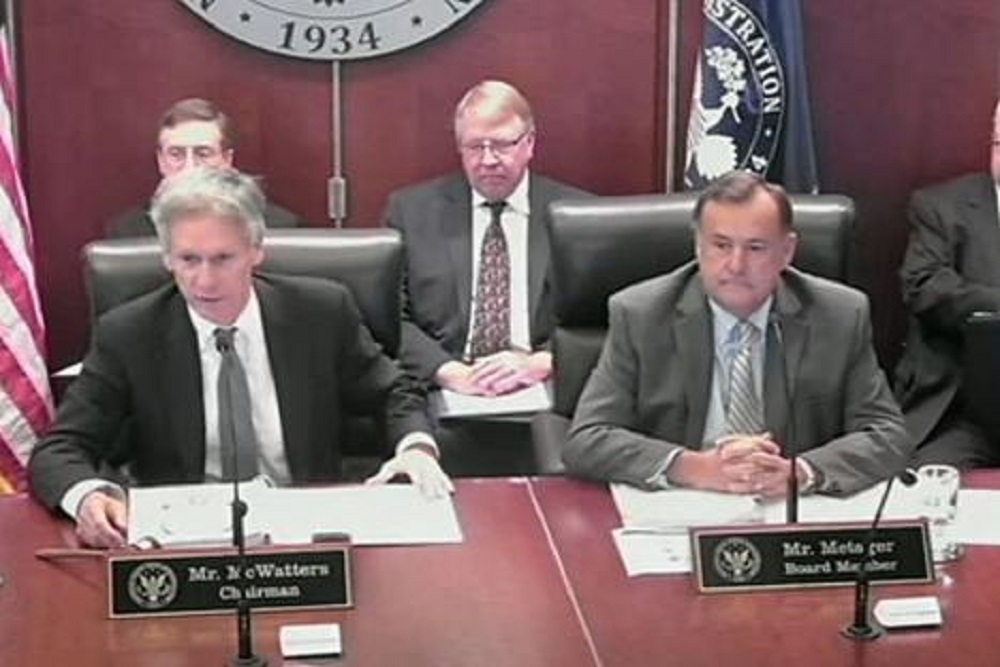CUNA Mutual Group issued the following announcement on Oct. 18.
ALEXANDRIA, Va.—The NCUA board Thursday approved by a 2-0 vote a one-year delay in the implementation of its risk based capital rule.
The approval to amend its rule issued in 2015 extends the effective date by one year to Jan. 1, 2020, though current prompt corrective action requirements would remain in effect. NCUA also approved changing the definition of a complex credit union from $100 million to $500 million—exempting an additional 1,026 credit unions from the final RBC rule.
The agency also said a proposal for alternative capital is on the way, and that a final rule on alternative capital would be in place in time for when the RBC rules take effect. Many credit unions have stated they need alternative capital under the risk based capital rules.
“Credit unions will have had six years (since the RBC rule was proposed and the new effective date) to either raise capital or reduce the risk on their balance sheet,” said Board Member Rick Metsger. “All available data suggest that that the net worth of complex credit unions has grown by more than 25%, and that these credit unions have reduced the risk on their balance sheet. As a result, the average complex credit union today has 18% risk based capital—more than twice what is needed to be adequately capitalized (under the RBC rule).”
Metsger said approving the RBC amendment allows the agency to move onto other issues.
“One of those issues is developing an alternative capital rule that can help the relatively small number of complex credit unions meet their risk based capital requirements,” continued Metsger. “Stakeholders have repeatedly told us that the implementation of the risk based capital rule should be tied to the adoption of an alternative capital rule. This one-year delay gives us time to do just that.”
Alternative Capital Proposal Coming
Metsger said he anticipates NCUA will be able to consider a proposed alternative capital rule “in the not too distant future. And the board will have the opportunity to adopt a final (alternative capital) rule with an implementation date that will coincide with the new effective date for the risk based capital rule.”
Credit union trade groups, while last week thanking NCUA for the proposal to extend the RBC effective date for one year, wanted a longer extension, two years or more. A provision to delay the rule by two years passed the House three times.
Board Chairman Mark McWatters called the one-year extension “very generous.”
“You have to draw a line somewhere,” McWatters stated. “I would not be inclined to go beyond that. Now if Congress goes beyond that, they go beyond that.”
By changing the definition of a complex credit union from $100 million to $500 million—exempting an additional 1,026 credit unions from the final RBC rule—NCUA pointed out that 90% of credit unions are exempt from RBC. That lowers the percentage of CUs that have to comply with RBC to 10% from 28%. Still, the agency pointed out, three-fourths of credit union assets are covered by the rule.
McWatters said the agency has struck a balance between providing regulatory relief to smaller credit unions and protecting the share insurance fund and credit unions.
“With 75% of credit union assets covered, this change does not present a safety and soundness risk,” he said.
FCU Bylaws
The board Thursday also unanimously approved a proposal to modernize the Federal Credit Union bylaws.
The proposal, the agency explained, focuses on making the bylaws more flexible so credit unions can handle self-governance better and also better protect members’ rights, and to make the rules more user-friendly—dropping “legalese” in favor of “plain English.”
The agency noted the proposal also addresses actions CUs can take when the credit union, member or staff safety are threatened by a member. McWatters noted that sometimes credit unions may not take quick action as they are concerned about federal rules regarding member expulsion getting in the way of taking, local criminal action against the person. He said the proposed changes will make it clear in the FCU bylaws that federal law does not trump taking swift action under local law.
Original source can be found here.












 Alerts Sign-up
Alerts Sign-up